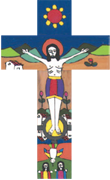Remembering Fr Rutilio Grande and the Parish of Aguilares
The Trust has recently been given a brief reflection by Anibal Meza, a Jesuit priest who is from Aguilares and who worked as a literacy coordinator with Rutilio Grande.
I got to know Fr Grande and the original team, which became responsible for the parish of Aguilares (the place I was born) in 1972. As well as Rutilio there were Bengochea and Salvador. Later others joined the parish team (Benigno, Marcelino and Gustavo – ‘Tavo’). For the people of Aguilares this was something new, since they had had a series of parish priests that had shown little interest in pastoral work.
The first novel aspect was presence and direct contact with the parishioners, both in the urban area and in the countryside. This was significant in that it meant an important shift from sacramental practice to a process of evangelisation. The people acquired new energy from the formation of communities that held reflections on the gospel. A variety of people who hadn’t had much to do with the Church began to be actively involved in parish life.
Religious celebrations acquired a different perspective and new energy. On one occasion during Holy Week, during the procession to the Holy Tomb, for the different points at which the coffin stopped places were chosen that were key to the political, social and economic life of Aguilares. For example, one of the stations was at the headquarters of the old Treasury Police (which was disbanded under the 1992 peace accords). Here the sermon was a condemnation of the repression and intimidation this police force practised in the rural areas.
Another novel aspect was the active role of the different pastoral workers from the rural areas (the ‘cantons’) through the structure of the Delegates of the Word (of God). The ordinary people, poor and exploited, had the Word of God in their hands, and this meant transformation, vindication, feeling that God cared for them, that they were sons and daughters of God. An example of this active role was the Maize Festival. The basic principle of this festival was that everything was free. Maize cobs (fresh, not dried) were free, donated by all the communities, and cooked maize and maize porridge were free too.
A striking more personal feature that stuck in my mind was how important the music of the Brazilian singer Roberto Carlos was for Fr Grande. For a while on Saturday afternoons some of his songs could be heard from the church’s outside loudspeakers. They included Un Millon de amigos (‘A Million Friends’), which is an invitation to build universal friendship, Jesus Cristo, a song that urges following the mission of Jesus Christ because ‘I am here now’, La Montaña (‘The Mountain’), which encourages regular prayer and reflection, and El Progreso (‘Progress’), a song in advance of its time that expresses upset at damage to the environment.
Rutilio was tall, slim, shy but firm and prophetic in his speech. I can see him in his black or grey clerical shirt, his hair always well cut, in which there were more grey hairs than black. That’s my memory of his physical appearance.
It is a pleasure to share – after fifty years – these memories of a person who devoted part of his life to practising the first Beatitude: ‘Blessed are the poor because the kingdom of heaven is theirs,’ and was martyred along with two others now declared blessed, Manuel and Nelson.
José Aníbal Meza Tejada
San Salvador, 1 January 2022.


